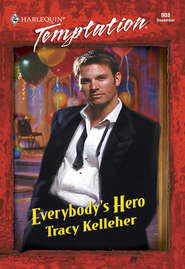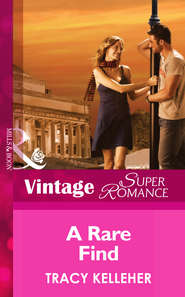По всем вопросам обращайтесь на: info@litportal.ru
(©) 2003-2025.
✖
The French Connection
Автор
Год написания книги
2018
Настройки чтения
Размер шрифта
Высота строк
Поля
Shelley shook her head. “I know of it, that’s all.” How many people could claim intimate knowledge of the epic Renaissance poem?
“Not to worry. Edmond can introduce it to you.” Isabelle smiled in that knowing way that immediately made Shelley suspicious. “Here, this way is to the Botticelli.” She pointed to the door on the opposite side of the room.
They glided along the marble floors into a large room with flaking, pale-green plaster walls. Fading Belgian tapestries depicting beheadings lined one wall, and atop a massive rococo sideboard sat a pair of matching Ming vases. Shelley bypassed those in favor of the art on the facing wall. There was a small panel painting of St. George, which to her trained eye appeared to be a Duccio. Next to it and practically hidden by heavy velvet curtains hung a delicately carved ivory. She turned to Isabelle. “Is it northern French? Fourteenth century perhaps?”
Isabelle squinted. “I had forgotten about that objet. It is so small, no?”
Small, yes, but definitely to die for. Roughly two inches by six inches, it depicted a pair of lions, male and female, cavorting in a forest under the watchful eye of exotic birds and small rodentlike creatures.
“But it’s so delightful, and a shame that it’s not better displayed.” Shelley loved the ivory—immediately. More than loved it. She lusted after it with greater intensity than she’d ever lusted for anything, Paul included. Which, come to think of it, probably said something about their sex life. True, he’s hung like a Clydesdale, but he has the finesse of one, too, Shelley had once confided to Abigail after too many Cosmopolitans.
“But surely you agree that the ivory cannot compare with our Botticelli?” Isabelle stepped next to what was clearly the family’s pride and joy.
Shelley approached the large framed drawing. It was a preliminary study for the painter’s famous Birth of Venus, in which the naked goddess of love rises from a scallop shell, her blond locks cascading over one shoulder. The thing of it was, the Italian Renaissance master had never been one of Shelley’s favorites—she always thought his women looked like Valley Girls without the benefit of blow-dryers. And now she was even more disappointed than usual upon viewing his work up close.
“I’ve never seen an original drawing of his,” she said, searching for a remark that would not offend her hostess. “And it’s amazing that you’ve managed to retain possession of these treasures after all these years.”
“Oh, they are not ours to possess really.” Isabelle looked genuinely shocked by Shelley’s comment. “We—the family, that is—think of ourselves more as caretakers of these things. It is our obligation to preserve them for the generations to come.”
Shelley nodded. She was beginning to understand how the aunts could live a life of genteel poverty and still be surrounded by priceless masterpieces.
The sound of a decisive tapping grew louder as footsteps approached. Shelley gladly turned her attention away from the art and the pressure of good manners.
“I managed to get Edmond on his mobile,” Marie-Jeanne announced. “He is rather busy right now, but he said he would be free for supper. You will stay and join us, no?”
“Of course she will stay. In the meantime, we can show her more of the chateau, the other rooms, especially Edmond’s room as a boy. And we can tell her more about Edmond.” Isabelle beamed and clapped her hands. The oversize moonstone ring nearly spun around.
Shelley was jet-lagged but she wasn’t brain-dead. She recognized a matchmaker caught in the thrill of the chase when she saw one. “I would be delighted to meet the count over supper. But until then I wouldn’t dare impose on your hospitality. I think it would be better to come back later when I am refreshed.” And when she didn’t have to listen to hours of stories about a card-carrying member of Mensa who was totally devoted to oral hygiene. A saga of mind over molars.
“If that is what you prefer, we would be happy to oblige,” Marie-Jeanne replied. “After all, we have much to discuss this evening, including the matter of the washing machine.”
“The washing machine?” Just when Shelley thought she had a grip on the old ladies, they hit her with another zinger.
Isabelle held up her hand in a rare display of authority. “The washing machine can wait. The girl is obviously tired. She needs to rest to be able to enjoy the meal.” A twinkle appeared in her eye. “I know—rather than have the tart for tea, I will serve the mûres to finish the supper. They are ripe and juicy, bursting with sensual pleasure.” She formed a circle with her thumb and forefinger and kissed her fingertips with her lips. Her eyes narrowed. Her carefully plucked eyebrows rose provocatively.
And somehow Shelley didn’t think Isabelle was reciting a lesson from Mademoiselle Bruce.
“DU CAFÉ?”
Shelley opened her eyes and blinked through the intense sunlight at the waiter. “Merci.”
He lowered the tiny cup of coffee to her table.
Two small sugar cubes nestled on the saucer. She unfolded the paper covers—as intricate as origami figures—and plopped the lumps in the minuscule amount of coffee. Then she used the itty-bitty spoon to stir. It was like a child’s tea set, Shelley thought. And everyone around her was doing the exact same thing—in addition to smoking nonstop. Not to mention the women, who were uniformly wearing high-heeled sandals that miraculously did not hamper their ability to maneuver on cobblestones. Unhealthy but coordinated people, these French.
Shelley lifted her coffee cup. Against the protests of Marie-Jeanne and Isabelle, she had insisted on leaving, not to take a rest at her hotel but to drive to nearby Marseilles. More specifically, Chateau d’If.
Shelley couldn’t help it. She had seen the schlocky film version of The Count of Monte Cristo with Richard Chamberlain at an impressionable time in her life—one of her older sisters had just described in gory detail what it was like to get your period. And memories of the TV and movie star—god bless his wooden performance—had seen her through many a sleepless night. How could she not visit Chateau d’If?
The sixteenth-century castle, one-time prison, was perched on a rocky island at the entrance to Marseilles’s harbor, and it had inspired Alexandre Dumas’s tale of vengeance and betrayal, wrapped up in a happy ending. Ah, the happy ending.
Shelley took another sip, finishing her coffee, and let the sugary remnants from the bottom of the cup slide down her throat. She closed her eyes. The stress of her current situation might be far from gone, but now, surrounded by blue skies and white cliffs—and under the influence of a sleep-deprived caffeine/sugar buzz—she could almost contemplate achieving her own happy ending. Even if it meant the IRS slapping on the cuffs and locking her up in one of the cells here on the island. Well, at least the view was better than at Attica Prison, not to mention the gift shop.
“Be positive,” Shelley murmured to herself. “There is no reason why life can’t imitate art.” Though frankly, she could do without the vengeance and betrayal part.
She leaned back and could practically feel the freckles popping out on her nose. No matter. She eased off her shoes and let the little bones in her toes relax on the warm stones. And here in the land of little cups and little demitasse spoons and little toes, Shelley allowed herself to stop being practical and to stop doing things such as obsessively recalculating her checking account balance. No matter what she did, anyway, it always came out to three hundred fourteen dollars and sixty-two cents.
Instead she let the golden Mediterranean light wreak havoc with the elasticity of her epidermis. Like some silly sixties movie starring Sandra Dee as the American ingenue, she gave in to the romance of southern France and daydreamed foolish thoughts of happy endings and finding a hero with a big H. Only there was no way she was transforming herself into some perky Sandra Dee redux, thank you.
“Miss McCleery?”
She smiled wider. Conjuring up a deep male voice with a French accent was a particularly nice touch to her daydream. The sensual sound embossed her colorful images.
“Miss McCleery?”
The voice became more insistent.
Shelley wrinkled her nose. It wasn’t good when a daydream ran away with itself. She concentrated on retaining the mood. The heat. The languor. The big, oversize hero.
Then she felt a light squeeze to her upper arm through her sleeve. Her eyes flashed open.
This was definitely not part of her dream.
Or maybe it was. A big, oversize hero appeared before her, his darkened figure outlined against the radiant blue sky.
She rubbed her eyes. A man. No question about it. Definitely a man. A man in what appeared to be a white, open-neck shirt, its sleeves pressed by the light sea breeze against his muscled forearms. He wore black trousers cut to perfection over his narrow hips and long, powerful legs. And as he arched his broad shoulders back upon returning to his ramrod-straight posture, she immediately thought of Marie-Jeanne.
Well, actually, she thought of Marie-Jeanne for no more than a nanosecond—posture was only posture, and he was a man, after all. “Quel homme!” What a man! as the teenager had exclaimed in her seventh-grade French textbook.
“Miss McCleery?” He turned his head at an angle, and Shelley caught the sparkle of even, white teeth.
She shaded her eyes from the sun and stared. If ever there was an excuse to ogle, this was it. “Oui, yes.”
“You were interested in the count?”
She lifted her chin, and with a slight smile that spoke of feminine wiles that appeared to have blossomed in the warmth of the French air, she replied, “Yes, I’m interested in the count.”
He lowered his chin. And slowly arched one eyebrow. “Then here I am.”
Shelley almost laughed. “Edmond Dantès, the Count of Monte Cristo?”
The corner of his mouth tilted up. His teeth glistened again. “No, Edmond, the Count de Montfort.”
4
TO SAY HER MOUTH HUNG OPEN wide enough to accommodate a small family of yaks was being understated. If the itty-bitty round table that held her teeny-tiny coffee cup were not blocking a direct path to the ground, Shelley would have been scraping her back molars off the dusty white pebbles at that very moment.
She rose, stumbling slightly as she pushed back her folding chair. “Count de Montfort.” Her voice sounded reedy, thin.











